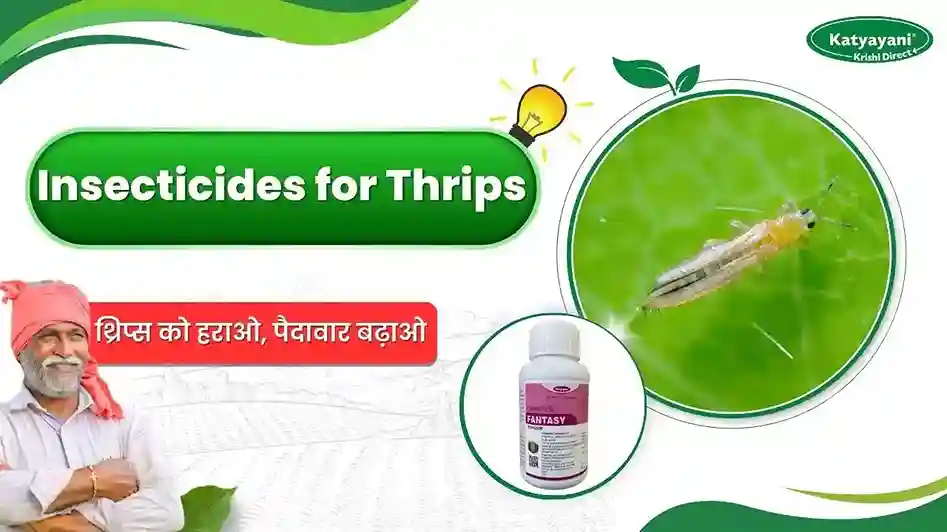🔹 Top 5 Thrips Control Chemical Insecticides
- Imidacloprid – A systemic insecticide absorbed by the plant, effective against thrips and other sap-sucking pests.
- Spinosad – A natural insecticide derived from soil bacteria; highly effective at all life stages of thrips.
- Acephate – Acts both as a contact and systemic insecticide, killing thrips effectively.
- Bifenthrin – Broad-spectrum insecticide for thrips and other garden pests.
- Lambda-Cyhalothrin – A fast-acting synthetic pyrethroid effective on thrips.
💡 Application Tip: Always follow the manufacturer’s label for dosage and frequency to avoid harming beneficial insects and plants.
🌿 Organic & Natural Solutions
- Neem Oil – Disrupts growth and reproduction of thrips.
- Insecticidal Soaps – Safe for plants; kills thrips on direct contact.
- Garlic/Chili Spray – Natural homemade repellents.
- Sticky Traps – Use yellow or blue sticky traps to attract and trap adult thrips.
🛡️ Effective Katyayaniorganic Products
- Katyayani 3-in-1 Organic Pesticide
➤ A natural pesticide that controls thrips, mites, and other common garden pests.
- Katyayani Verticillium Lecanii Bio Pesticide
➤ An organic biological agent effective against thrips, aphids, whiteflies, and other sap-sucking insects.
- Katyayani Fantasy Insecticide
➤ Dual-action formula targeting thrips, aphids, and whiteflies, suitable for vegetables, fruits, and ornamental plants.
🌱 Thrip Management Tips
- ✂️ Prune and destroy heavily infested plant parts.
- 🌟 Use reflective mulches to repel thrips.
- 🐞 Attract beneficial insects like ladybugs and lacewings.
- 🧹 Maintain garden hygiene and remove debris where thrips may hide.
- 🌬️ Avoid overcrowding to ensure airflow and reduce humidity.
❓ Frequently Asked Questions (FAQs)
Q1. What are thrips and how do they affect plants?
A: Thrips are tiny insects that suck sap from plant tissues, causing silver streaks, leaf curling, and stunted growth. They can also transmit viruses that severely damage plants.
Q2. Which are the best insecticides for thrips?
A:
- Spinosad – Targets all life stages.
- Imidacloprid – Absorbed systemically for longer-term control.
- Neem Oil – Disrupts thrip behavior.
- Acephate – A dual-action chemical option.
- Pyrethrin-based products – Effective but need more frequent use.
Q3. How do systemic insecticides like Imidacloprid work?
A: They’re absorbed by plant roots/leaves and spread internally. Thrips ingest the toxin while feeding, resulting in effective long-term control.
Q4. Are organic insecticides effective?
A: Yes. Neem Oil and Spinosad are proven organic options. They are safer for pollinators and the environment when used properly.
Q5. How frequently should I apply insecticide?
A: Every 7–14 days, depending on infestation severity. Always check product instructions.
Q6. Can I use insecticidal soap for thrips?
A: It can help but may not be as effective due to the tough exoskeleton of thrips. Consider using more targeted options like Spinosad or Imidacloprid.
Q7. Are there environmental concerns with insecticides?
A: Yes. Chemical insecticides may affect beneficial insects and pollinators. Apply early morning or late evening. Prefer organic or biorational options where possible.
Q8. Can beneficial insects help control thrips?
A: Definitely. Introduce natural predators like Ladybugs, Predatory Thrips, and Lacewings for sustainable pest management.
Q9. Do sticky traps work for thrips?
A: Yes. Use yellow or blue sticky traps to catch adult thrips and monitor population levels.
Q10. How can I prevent future thrips infestations?
- Regular plant inspections
- Use thrip-resistant plant varieties
Clean garden debris
Proper spacing for airflow
- Keep plants healthy with proper nutrition and watering
Q11. Can insecticides be used on flowering plants without harming pollinators?
A: Yes, but apply when pollinators are inactive (early morning/evening). Prefer Spinosad or Neem Oil, which are less harmful when used correctly.
Q12. How fast do insecticides kill thrips?
A: Contact insecticides like Pyrethrin act within hours. Systemic ones like Imidacloprid may take 2–4 days for full effect.
Q13. Can thrips cause permanent damage?
A: Yes. If untreated, thrips can cause deformed growth, virus spread, and reduced yields. Early treatment is essential.


